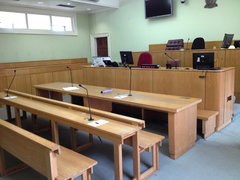Posted on February 04, 2015

While there is no specific right to access justice in the International Covenant on Economic, Social and Cultural Rights (ICESCR), without it the ability to enforce rights becomes meaningless.
The Optional Protocol to ICESCR provides individuals with a complaints mechanism under the Committee on Economic, Social and Cultural Rights. However, like the Committee Against Torture and the Human Rights Committee, while their decisions are persuasive as they can censure the governments, they are not binding and they cannot force the state to comply with the Treaty.
The ICCPR (International Covenant on Civil and Political Rights), the parallel agreement to ICESCR, requires that States must provide an effective remedy to the violation of rights and freedoms. Article 2(3)(b) then specifies that this remedy should preferably be judicial.
The courts are one avenue for the enforcement of rights where a country enjoys rule of law. Courts are seen as independent and objective arbiters compared to governments and other State bodies who might otherwise adjudicate. They consider not only national sources of law, but international treaties and norms. They also have the ability to enforce their decisions and make the Government accountable.
For this right of access to justice to exist in any meaningful sense there is a requirement that its access not be prevented by a monetary threshold that is too high for the average person to access. Ideally economic status should not be a consideration at all.
However, access to courts is not cheap or simple. Legal representation can be incredibly expensive. If a person cannot afford to hire legal representation, but can still technically bring the case him or herself, the issue of access to justice is still central. The court system can be hugely intimidating. Trying to figure out how to get a case off the ground in the first instance can seem like a mammoth task all by itself before the legal process even really begins.
Then the litigant is required to file certain types of evidence, to submit arguments based on legal precedent and know what relief they are seeking. Even small things like knowing what to call the judge and when to stand or sit make a big difference. Fundamentally, our legal system fails to cater for those who do not have the benefit of legal training.
Access to justice, rather than mere access to the courts, therefore seems to be a right only enjoyed by the wealthy. This has important implications for the relationship between rights and poverty.
Access to justice has to be free from any wealth-based considerations because all other rights are contingent on the ability of the individual to uphold and enforce their rights through the justice system if necessary. You need to be able to find redress for discrimination, to challenge unfair work practices and to ensure that any assistance provided by the State such as education or social welfare is not unfairly denied to you. Access to justice becomes imperative in order to access all of your other rights.
An example of Ireland failing to uphold an ICESCR right concerns Article 9, the right to social security. While Ireland has a civil legal aid system, there are some specific exclusion areas of law or fora where it cannot be accessed. Currently, you will not receive civil legal aid for most tribunals, including the Social Welfare Appeals Office. Cases before this office often concern complicated points of law, such as the application of the habitual residence condition, and the avenues to appeal are unclear and difficult to understand. One TD recently described the social welfare appeal system as a ‘spider’s web’ while holding up a complex diagram of the different routes of appeal. Even though a semi-judicial body has been set up, the lack of access to legal representation for many does prevent people from accessing social security.
Of course, in an ideal world we would not need to go to the courts. The Government would never incorrectly deny someone social welfare. There would never be discrimination. Everyone would have perfect access to education and health services. Working conditions would always be fair and equitable. We would all enjoy and adequate standard of living.
Unfortunately even with good intentions and the will to realise these rights, there are still situations where a person may be denied them. This is why civil legal aid is so critical in any society which professes to take rights seriously. And to enforce the fundamental rights provided for under the Covenant on Economic, Social and Cultural Rights – rights to which our state has committed itself to respect, protect and promote - access to civil legal aid is vital.
Liz O’Malley is Legal Aid Intern in FLAC. Her personal blog on access to justice and politics is at lizomalley.com